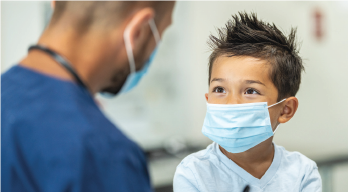Cases of serious post-COVID-19 complications are rare, but help is available.
 Almost all children and adolescents who get COVID-19 will have mild symptoms, such as a low-grade fever, fatigue and cough, and recover completely. Others will have no symptoms at all.
Almost all children and adolescents who get COVID-19 will have mild symptoms, such as a low-grade fever, fatigue and cough, and recover completely. Others will have no symptoms at all.
Some of them, however, develop serious and even life-threatening symptoms about four to six weeks after the initial infection. “The cases are few and far between,” says Uzma Hasan, MD, Division Chief of Pediatric Infectious Diseases at Saint Barnabas Medical Center (SBMC) and a member of RWJBarnabas Health Medical Group. “However, a small percentage of children who have had COVID-19 will develop a combination of very serious symptoms that involve more than one organ system.” Complications can include heart inflammation, kidney damage, neurologic symptoms, excessive blood clotting and more.
Much remains unknown about the condition—known as multisystem inflammatory syndrome in children (MIS-C) or pediatric post-COVID-19 syndrome—including its exact connection with COVID-19. For reasons doctors do not yet understand, African-American and Hispanic children appear to be most at risk.
What’s known: Hospitals around the world have been reporting an increase in cases. Fortunately, the vast majority of children affected recover fully with medical care. To ensure that these patients get the care they need, SBMC has created a Pediatric Post-COVID CARE (Comprehensive Assessment, Recovery and Evaluation) program, directed by Dr. Hasan.
Comprehensive Care
“The key thing for parents to know is that if a child has had COVID-19—even if it was asymptomatic, but especially if the child was hospitalized—the child should have regular follow-up with a pediatrician for at least four to six weeks after the infection,” Dr. Hasan says. “That is when symptoms of MIS-C—red eyes, belly rashes, shortness of breath—tend to show up.”
If Dr. Hasan, in collaboration with the pediatrician, determines there is a need for specialty services, a patient navigator will facilitate the next steps at the Pediatric Post-COVID CARE program. Because each MIS-C case is different, treatment is individualized. The program has gathered a broad range of experts who can deliver a variety of services, including pediatrics, behavioral health, nurse navigation, cardiology, gastroenterology, hematology, nephrology, neurology, pulmonology, physical, speech and cognitive rehabilitation, radiology and rheumatology.
“We will provide structured follow- up for the patient with all necessary subspecialties,” says Dr. Hasan. “Our goal is to provide comprehensive care to make sure these kids don’t slip through the cracks.”
Act If You See These Post-COVID-19 Symptoms
If your child shows any of these symptoms, contact your primary care provider right away: persistent fever, abdominal pain, vomiting, diarrhea, neck pain, rash, swelling of tongue or lips, swelling of feet, bloodshot eyes or chronic fatigue.
Call 911 or go to the Emergency Department if your child has any of these emergency signs: trouble breathing, pain or pressure in the chest that does not go away, new confusion, inability to wake up or stay awake, bluish lips or face, or severe abdominal pain.
To learn more, visit www.cdc.gov/mis-c/.
The Pediatric Post-COVID CARE program at Saint Barnabas Medical Center works in collaboration with your pediatrician. To make an appointment for your child, call 888.COVID94 (888.268.4394) and press option 2, or email postcovidcare@rwjbh.org.